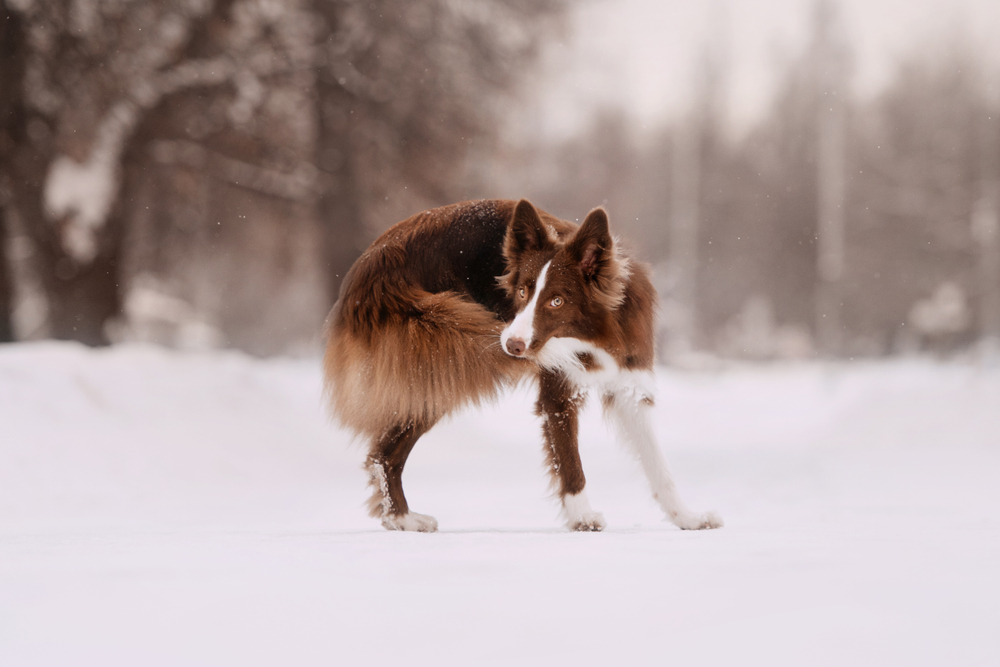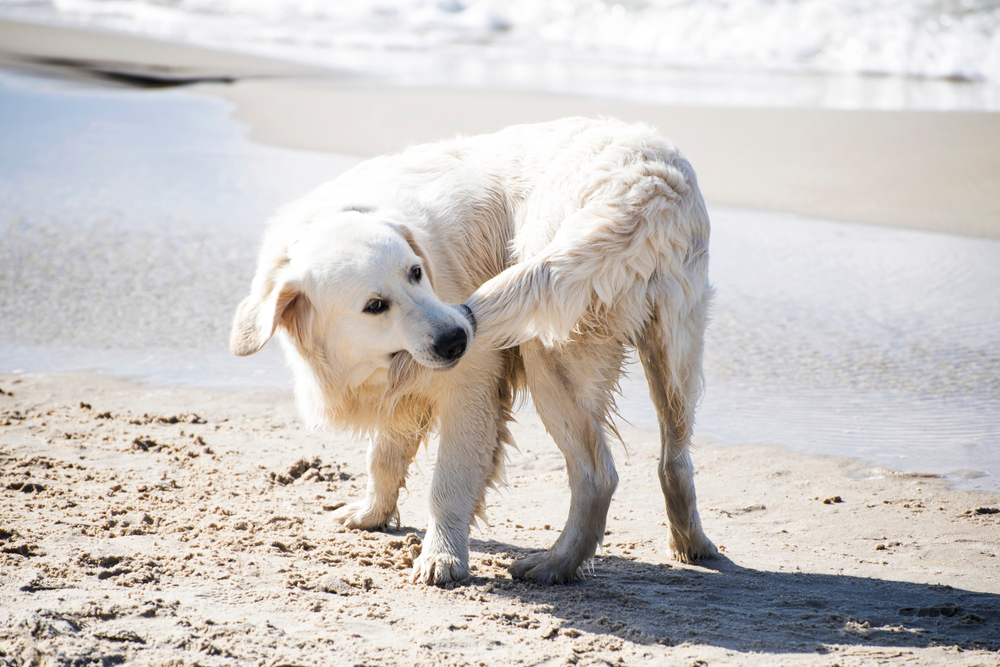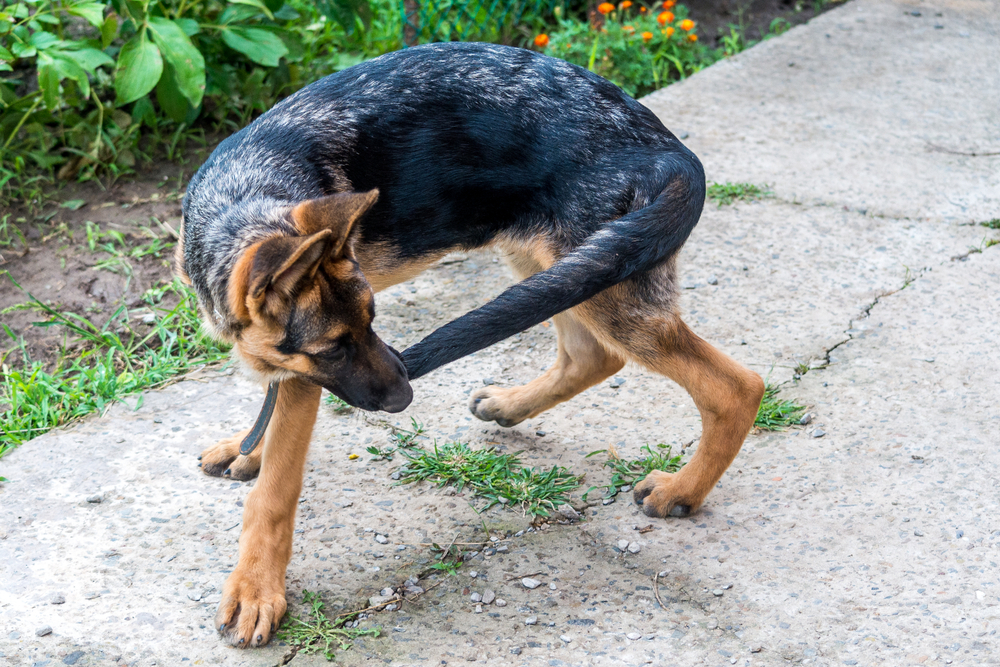Regardless of the size of your home, your career, or your lifestyle, the perfect dog is out there waiting for you. In fact, there are so many dog breeds out there that official organizations disagree on how many breeds exist. According to the American Kennel Club (AKC), there are 190 dog breeds. However, the Fédération Cynologique Internationale (FCI) — also known as the World Canine Organization — recognizes a whopping 360 dog breeds worldwide.
With so many dog breeds, each distinct in size, temperament, and appearance, you might assume their behavior varies as widely as their looks. As it turns out, that’s not necessarily the case. No matter their breed, dogs share one common quirk: chasing their tails. Why do dogs chase their tails? The answer is so obvious, you might find it unbelievable.

Why do dogs chase their tails?
You’ve seen it before. One minute, your dog’s behavior is perfectly calm; the next instant, he’s zooming around the yard, chasing after his own tail. While a dog chasing his tail makes for a comical picture, you may be wondering if this bizarre quirk is a sign that something is wrong with your pup. Here are a few reasons your pooch might chase his tail.
He’s having a good time
Thankfully, most dogs chase their tails simply because they’re playing. Puppies are particularly fond of chasing their tails, as they’re just now figuring out they have such an appendage attached to their bodies. Your pup might initially see his tail from the corner of his eye and think he has a playmate. Try not to worry that running in endless circles will make your pup dizzy. According to Wag!, dogs don’t suffer from dizziness the same way we do.
He doesn’t have anything better to do
Dogs are also prone to chasing their tails for another (extremely relatable) reason: they’re bored. Just like us, dogs sometimes fidget when they’re bored. While we have the ability to distract ourselves by playing a game on our phones, clicking a pen, or twirling our hair, dogs have a limited number of ways to occupy themselves. Because dogs require mental and physical stimulation to stave off boredom, chasing his tail could be your pup’s way of entertaining himself when the doldrums set in.
He has an underlying condition
It’s perfectly normal for your dog to chase his tail every now and then. Unfortunately, dogs who frequently chase their tails could be suffering from an underlying medical condition. Dr. Steve Weinberg, DVM and founder of 911 Vets, tells the American Kennel Club, “Obsessive chasing could be due to a brain abnormality akin to seizure-like activity. Other reasons could be a painful area where a tail was docked, an infection, or even cancer.”
Your dog has anxiety
We aren’t the only species to suffer from anxiety. In dogs, anxiety often takes the form of compulsive behaviors, such as tail chasing, excessive grooming, destructive behavior, incessant barking, pacing, drooling, and urination or defecation inside the home. Speak to your vet about the possibility of medication or behavioral modification if your dog exhibits these symptoms.
Your dog could have fleas
If your pup has been infested by fleas or ticks, he might chase his tail in order to chew on an itchy bite. Check your dog for signs of fleas or ticks if he chases and bites at his tail. Treating a pest invasion can be tricky, so you’ll want to make sure to treat your dog for fleas and ticks year-round to prevent a second infestation.
Your dog is genetically predisposed to chasing his tail
According to an article by the National Center for Biotechnology Information, evidence suggests that certain breeds are more likely to chase their tails than others. German shepherds, Anatolian sheepdogs, bull terriers, West Highland white terriers, and Jack Russell terriers all seem to show a predisposition to chasing their tails.

Is it bad if my dog chases his tail?
For the most part, no, it isn’t bad if your dog chases his tail occasionally. However, it can be a sign of a mental–or physical–disorder if tail chasing becomes a compulsive behavior your pup can’t seem to stop. If your dog chases his tail frequently, it’s a good idea to take him to the vet for a checkup. You can never be too careful when it comes to your pup’s health, and your vet will be able to detect any underlying problems causing your dog’s compulsive behavior.

How do I stop my dog from chasing his tail?
One of the easiest ways to break your dog of his tail-chasing habit is to redirect his attention. Grab your pup’s favorite toy and throw it; he’ll most likely stop what he’s doing and chase after his toy. If his toy isn’t enough to distract him from chewing on his tail, offer him a tasty treat instead. A well-trained dog will stop when he’s given a command that’s incompatible with his behavior. Try telling your dog to “sit” or “come here” when he begins chasing his tail. Training him out of the behavior may take time and effort, but you’ll break him of the habit eventually.
Watching your dog chase his tail can be entertaining, but you’ll need to take him to the vet if it becomes a fixation. Obsessive tail chasing can be a symptom of a parasitic infestation, a mental disorder, or an underlying health problem. Once your vet rules out any problematic causes, you’ll want to work with your pup to curb his behavior–or eliminate it for good.
Editors' Recommendations
- Are ‘dog years’ really 7 human years? How to calculate your dog’s age
- Why does my dog have a bald patch on their tail? Here are the answers you need
- Do puppies sleep a lot? These are the perfectly normal sleeping habits of a healthy pup
- Where to put a dog crate in your house depends on these important factors
- What you need to know about dogs with blue eyes




